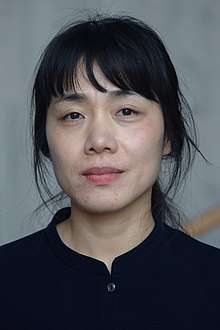Kim Soom
Kim Soom is a South Korean writer. She is known for her “elaborate descriptions and aesthetic style” and for her “vivid allegories.”[1] Her recent novels critically examine modern and contemporary Korean history. In particular, Han myeong (한 명 One Left) deals with the issue of Comfort Women in the Imperial Japanese army and L eui undonghwa (L의 운동화 L’s Sneakers) with South Korean democratization.
Kim Soom | |
|---|---|
 Kim Soom during Scener & samtal at the Museum of World Culture in Gothenburg, 2019 | |
| Native name | 김숨 |
| Born | 1974 (age 45–46) Ulsan |
| Occupation | Novelist |
| Language | Korean |
| Nationality | South Korea |
| Alma mater | Daejeon University |
| Korean name | |
| Hangul | 김숨 |
| Revised Romanization | Gim Sum |
| McCune–Reischauer | Kim Sum |
| Legal name | |
| Hangul | 김수진 |
| Revised Romanization | Gim Sujin |
| McCune–Reischauer | Kim Sujin |
Life
Kim was born on July 23, 1974 at a seaside town in Bangeojin, Ulsan. When she was six, her father went to the Middle East for a manual labor job, leaving the rest of the family to move into her grandfather's house in Geumsan, South Chungcheong Province, where she ended up spending her childhood. Upon entering high school, she joined a literature club called Cheong-un Literary Society and dabbled in writing poetry. In 1997, she won the Daejeon Ilbo New Writer’s Award for her first short story “Neurimae daehayeo” (느림에 대하여 On Slowness), which she wrote because she wanted to experiment with longer pieces of writing than poetry. In 1998, Jungseui sigan (중세의 시간 Time in the Middle Ages) received the Munhakdongne New Writer Award, kicking off her career as a novelist. After graduating from university, she worked for a newspaper outside of Seoul as a proofreader, and then for a publisher as an editor over many years.[2]
Writing
A grotesque rendering of the world is a hallmark of Kim’s early novels. Rather than portraying life with verisimilitude, her characters reveal life’s underlying anxieties through their faint presence and strange language. This is why readers often get the impression that the setting of her novels and dynamics between characters are a literary, or even theatrical, reproduction of the world. This does not mean that Kim’s novels deal with issues that don’t pertain to reality. On the contrary, they can offer a more in-depth look at truths existing in reality.
Two novels have been published since 2016: Han myeong (한 명 One Left) addresses the issue of Comfort Women, while L eui undonghwa (L의 운동화 L’s Sneakers) tells the story of student activist Lee Han Yeol, whose death catapulted the June Democracy Movement of 1987. These two works are different from Kim’s previous novels; their subject matter involves historical incidents that were critical to forming South Korea’s sense of solidarity as a nation and a democracy. This shift in her focus should be noted alongside a contemporary’s work on the Gwangju Uprising, namely, Human Acts (소년이 온다) by Han Kang.
Works
Short story collections
- 『투견』, 문학동네, 2005. Fighting Dog. Munhakdongne, 2005.
- 『침대』, 문학과지성사, 2007. Bed. Moonji, 2007.
- 『간과 쓸개』, 문학과지성사, 2011. Liver and Gallbladder. Moonji, 2011.
- 『국수』, 창비, 2014. Noodles. Changbi, 2014.
Novels
- 『백치들』, 랜덤하우스코리아, 2006. Idiots. Random House Korea, 2006.
- 『철』, 문학과지성사, 2008. Iron. Moonji, 2008.
- 『나의 아름다운 죄인들』, 문학과지성사, 2009. My Beautiful Sinners. Moonji, 2009.
- 『물』, 자음과모음, 2010. Water. Jaeum and Moeum, 2010.
- 『노란 개를 버리러』, 문학동네, 2011. To Abandon the Yellow Dog. Munhakdongne, 2011.
- 『여인들과 진화하는 적들』, 현대문학, 2013. Women and Their Evolving Enemies. Hyundae Munhak, 2013.
- 『L의 운동화』, 민음사, 2016. L’s Sneakers. Minumsa, 2016.
- 『한 명』, 현대문학, 2016. One Left. Hyundae Munhak, 2016.
Awards
- 1997: Daejeon Ilbo New Writer’s Award for “Neurimae daehayeo” (느림에 대하여 On Slowness)
- 1998: Munhakdongne New Writer Award for "Jungseui sigan" (중세의 시간 Time in the Middle Ages)
- 2012: 7th Heo Gyun Literary Writer Award for Noran gaereul beorireo (노란 개를 버리러 To Abandon the Yellow Dog)
- 2013: Hyundae Literary Award for Geu bameui gyeongsuk (그 밤의 경숙 One Evening with Kyung-sook)
- 2013: Daesan Literary Award for Yeoindeulgwa jinhwahaneun jeokdeul (여인들과 진화하는 적들 Women and Their Evolving Enemies).
- 2015: Yi Sang Literary Award for Ppuri iyagi (뿌리 이야기 Story of Roots)
References
- Kim, So-yeon; Kim, Jeong-hwan; Baek, Ji-yeon (Spring 2016). "이 계절에 주목할 신간들". Changbi: 350.
- Kim, Soom (2014). The Night Nobody Returns Home (아무도 돌아오지 않는 밤). Seoul: Asia Publishers. pp. 130–134.